Updated on Feb. 10 with Google's failure to respond
The push of a button on the computer tablet elicited magical results as a class of Pocopson Elementary fifth-graders uttered a spontaneous, sustained chorus of aahs on the afternoon of Monday, Feb. 8.
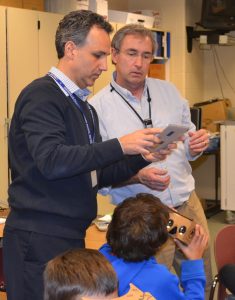
Teacher Dave Lichter had inadvertently hit pause, interrupting the student’s virtual reality field trip to Madagascar. A quick adjustment by Dave Carter, a technology instructor at the school, and the students were whisked back to an exotic island in the Indian Ocean.
Unionville-Chadds Ford School District Superintendent John Sanville heard the loud, excited utterances from down the hall. He had been on his way to observe Google’s Expeditions Pioneer Program, which had a tryout at Pocopson Elementary that day, and so he quickened his pace.
At first glance, with brown cardboard rectangles held in front of their eyes, the students looked poised to watch a solar eclipse. But this lesson advanced the shoebox-with-a-pinhole procedure by light years.
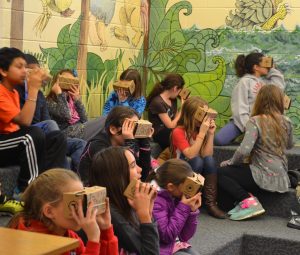
Carter explained that the district’s technology teachers learned about the free trial some months ago and submitted a request to participate but didn’t hear back. Carter said he continued to watch Google’s schedule to see where the program was being previewed, and he submitted a second request a few weeks ago when it looked like Google teams would be the area.
“I heard back right away so we didn’t have a whole lot of time to get ready,” he said.
Teachers at each grade level agreed on a journey that fit their curriculum, selecting from about 150 choices, Carter said. So while fifth-graders enjoyed Madagascar, fourth-graders visited Yosemite, third-graders traveled to Mars, and second-graders immersed themselves in landforms.
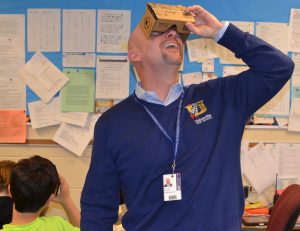
A Google staffer, who parked a brightly-colored Expeditions mobile in the school parking lot, arrived with 60 devices – a cardboard box equipped with a cellphone – and two tablets, one for each teacher participating in two sessions that ran back-to-back all day.
From the tablet, the teacher controlled the specific destination and watched what the students were viewing while having access to supplementary information designed to augment the educational experience. And with a 360-degree view accentuated with 3D images, video, and ambient sounds, students also got plenty of exercise moving around to see the panorama.
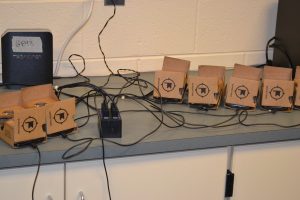
“I feel like I’m going to fall,” one student remarked as he craned his neck backwards. “Wow! Did you see the rainbow?” another asked, looking skyward.
Kathryn Markloff, who teaches fourth-grade, said her students had plenty of time to get excited about the Google exercise. “We’re part of the last group so they’ve been hearing the buzz all day from other classes,” she said.
According to the Google website, more than 100,000 students have used Expeditions in their classes since the program launched in September. The Wildlife Conservation Society, PBS, the American Museum of Natural History, the Planetary Society, and the Palace of Versailles contributed to developing the various curriculums, which ranged from a trip to outer space to an exploration beneath the sea.
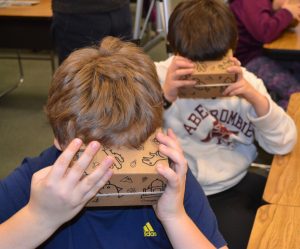
“I love it,” said Annette Hug, a personal care assistant for one of the 5th-graders, as she watched the students’ reactions. “To me, this is what education is about; the ooohs and aaahs and excitement about learning.”
Carter received the same unanimous reaction when he asked each class what they thought: “It’s awesome!”
Like most lessons in technology, this one did not come bug-free. A few of the devices had on-off buttons that activated too easily, causing students to lose their panoramic perspective. And by the end of the day, batteries started to wear down from the constant use.
Undaunted, Carter set up a charging station at the back of the room so he could swap out the failing devices and keep the experience virtually intact.
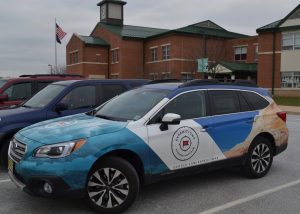
“This is very cool,” noted Sanville after borrowing a viewer from one of the students.
Perhaps to lessen the pain of leaving virtual reality, Lichter ended the Madagascar lesson with a warning for those students so excited that they might want to hop on a plane. He pushed a button that prompted shrieks and gasps as the students suddenly found themselves surrounded by one of Madagascar’s more sinister inhabitants: sharks.
Then reality reared its head, and it was back to class for a spelling pre-test.
The Google representative said he was not authorized to speak to the press so a question about a school’s cost to continue using the program was referred to a media email address. Carter said he did not know what Google would charge – information that is not readily available on its website.
Google failed to respond, except to acknowledge receipt of one of two emails that were sent to the press address.


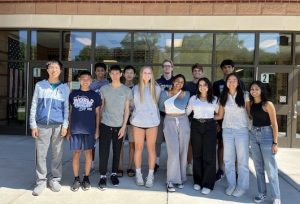
Comments